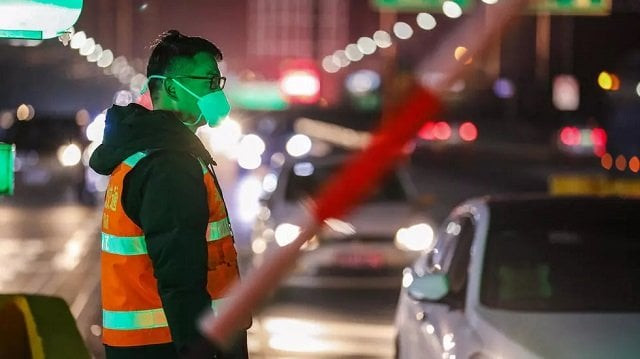Pakistan on alert over deadly China virus
Emergency operation cell set up to monitor the situation

Emergency operation cell set up to monitor the situation. PHOTO: AFP/FILE
Special Assistant to the PM on Health Dr Zafar Mirza while chairing a meeting of senior officials discussed the precautionary measures and a response mechanism in the wake of the recent cases of Corona virus emerging across China. The virus has spread to five countries including the US.
The PM’s aide told the participants of the meeting that the directorate of the health ministry dealing with airport and port health services had been asked to maintain strict vigilance at the points of entry and check travellers coming in from affected areas.
“The directorate has been advised to strengthen health desk and quarantine arrangements at the ports of entry,” he added.
There are 41 incoming flights from China to Pakistan every week.
“I am writing to all chief ministers to ensure necessary arrangements in all the provinces,” said Mirza. “I am establishing contact with the National Disaster Management Authority (NDMA) while we will also be working closely with the Embassy of China in Pakistan to deal with the crisis.”
China virus outbreak spooks global markets as fourth death reported
The special assistant to the PM said there was no need to panic as the situation was being monitored, adding that regular updates concerning the virus will be shared with the public.
On the directions of the PM’s aide, the National Institute of Health Islamabad has issued an advisory and alert to all provincial health departments especially at points of entry at all airports and ground crossings in Pakistan to remain vigilant.
The purpose of the advisory, according to NHS, is to alert and sensitise the health staff across the country to detect suspected cases of the viral infection and take preventive measures.
The death toll from the new SARS-like virus rose to 17 on Wednesday.
The coronavirus has caused alarm because of its similarity to SARS (Severe Acute Respiratory Syndrome), which killed nearly 650 people across mainland China in 2002-2003.
With hundreds of millions of people travelling across China this week for the Lunar New Year holiday, the National Health Commission announced measures to contain the disease, including sterilisation and ventilation at airports and bus stations, as well as inside planes and trains.
In Wuhan, the epicentre of the epidemic, large public events were cancelled and international football matches were moved to a new location. Visitors were urged to stay away, while residents were advised to not to leave the central city, which is home to 11 million people.
"If it's not necessary we suggest that people don't come to Wuhan," Wuhan Mayor Zhou Xianwang told state broadcaster CCTV.
The illness is mainly transmitted via the respiratory tract and there "is the possibility of viral mutation and further spread of the disease", health commission vice minister Li Bin told a news conference in Beijing.
More than 500 cases have now been reported, with the majority in Wuhan, capital of China’s Hubei province.
The virus has now infected at least 444 people in Hubei province alone, said provincial Chinese officials at a press conference, adding that the death toll had risen from nine to 17.
Major cities, including Beijing, Shanghai, and Chongqing have also reported cases, as well as provinces in northeastern, central, and southern China.
The World Health Organisation started an emergency meeting on Wednesday to decide whether or not to declare a rare global public health emergency over the disease, which has now been detected in the United States, Taiwan, Thailand, Japan and South Korea.
The Chinese government has classified the outbreak in the same category as the SARS epidemic, meaning compulsory isolation for those diagnosed with the illness and the potential to implement quarantine measures.
But they still have not been able to confirm the exact source of the virus.
"We will step up research efforts to identify the source and transmission of the disease," Li said, adding that "the cases are mostly linked to Wuhan".
Countries have intensified efforts to stop the spread of the pathogen - known by its technical name 2019 Novel Coronavirus (2019-nCoV).
Passengers are facing screening measures at five US airports and a host of transport hubs across Asia. Britain and Italy on Wednesday also announced enhanced monitoring of passengers from Wuhan.
A prominent expert from China's National Health Commission confirmed this week that the virus can be passed between people.
However, animals are suspected to be the primary source of the outbreak.
A Wuhan market is believed to be the epicentre of the outbreak.
(With additional input from AFP)



















COMMENTS
Comments are moderated and generally will be posted if they are on-topic and not abusive.
For more information, please see our Comments FAQ